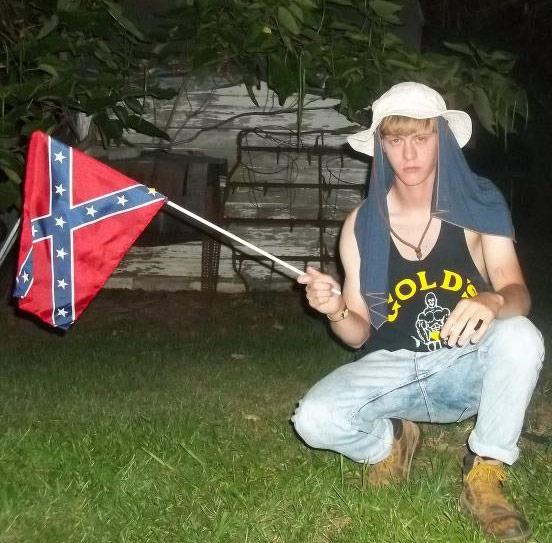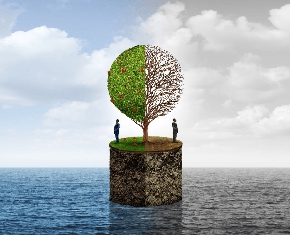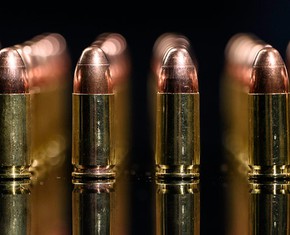The views expressed in our content reflect individual perspectives and do not represent the authoritative views of the Baha'i Faith.
In the wake of the tragic hate-motivated shooting at the Emanuel African Methodist Episcopal Church in Charleston, South Carolina, the nation and the world reflect on the state of race relations once again.
Laws don’t normally prevent hate crimes. At best, they may deter them, but even the deterrent effect is unproven. So what’s the cure to the social and psychological disease of racial hate? It’s easier said than done, but let’s go ahead and say it. Allow me to quote the Baha’i philosopher, Alain Locke:
If they will but see it, because of their complementary qualities, the two racial groups have great spiritual need, one of the other. It would truly be significant in the history of human culture, if two races so diverse should so happily collaborate, and the one return for the gift of a great civilization the reciprocal gift of the spiritual cross-fertilization of a great and distinctive national culture. – Alain Locke, The Negro in America, p. 50.
The cure for hate is love. It’s as simple as that. But bridging the racial divide presents an enormous challenge, with the history of slavery, its legacy of Jim Crow apartheid, the present-day glass wall of self-segregation, and the glass ceiling of “polite racism” that precludes equitable racial advancement.
Alain Locke had a great deal to say about promoting ideal race relations and bridging the racial divide. First, let’s start with a famous series of lectures that Alain Locke gave at Howard University in April and May 1915, and again in March and April, 1916, in which Locke deconstructs race as a biologically determined fact and redefines race as purely a social construct:
Physical race or “pure race” is a scientific fiction—biologically, it is irretrievable, if ever possessed—historically, it is an anachronism, being attributed to national not racial groups, and then only to justify the historical group sense—politically, it is a mere policy or subterfuge of empire—it is socially extinct under a competitive industrial order, as its oldest origin as caste was really economic, and required artificial economic limitation for its perpetuation. – “Race Contacts and Inter-Racial Relations: A Study in the Theory and Practice of Race,” The Works of Alain Locke, pp. 258-259.
Having exposed the social and economic motivations for racial prejudice, Alain Locke recommends solutions to America’s racial crisis and its relation to world democracy:
America’s democracy must begin at home with a spiritual fusion of all her constituent peoples in brotherhood, and in an actual mutuality of life. Until democracy is worked out in the vital small scale of practical human relations, it can never, except as an empty formula, prevail on the national or international basis. Until it establishes itself in human hearts, it can never institutionally flourish. Moreover, America’s reputation and moral influence in the world depends on the successful achievement of this vital spiritual democracy within the lifetime of the present generation. (Material civilization alone does not safeguard the progress of a nation.) Baha’i Principles and the leavening of our national life with their power, is to be regarded as the salvation of democracy. In this way only can the fine professions of American ideals be realized. – “America’s Part in World Peace,” In Harlan Ober, “The Baha’i Congress at Green Acre,” The Baha’i Magazine (Star of the West) 16.5 (August 1925): p. 525.
Locke didn’t believe that the Baha’i community itself would cure racism, but rather that “Baha’i principles” will, in practice, make a real difference for the good. He had no proprietary interest in emphasizing their source(s)–only the common societal interest in promoting ideal race relations.

Dylann Roof
Dylann Storm Roof is just 21 years old. Without even the least excuse or justification for this horrendous hate, Roof offers us an object lesson in the need to reach our adolescents and young adults by empowering them spiritually, encouraging and training them to base their present lives and future careers on the principle of human solidarity and service to humankind. If we don’t, others with an agenda of separation and hatred will reach them:
God is the author of racism. God is the One who divided mankind into different types…. Mixing the races is rebelliousness against God. – Council of Conservative Citizens website, 2001
Reaching out to adolescents and young adults with a message of unity and equality isn’t a sure-fire cure—after all, Dylann Roof had a close Black friend back in grade school. But it’s effective social intervention, nevertheless. Forgiveness, by itself, won’t solve the problem. Only the creation of love over hatred will provide the ultimate care for racism:
My hope is that through the zeal and ardour of the pure of heart, the darkness of hatred and difference will be entirely abolished, and the light of love and unity shall shine; this world shall become a new world; things material shall become the mirror of the divine; human hearts shall meet and embrace each other; the whole world become as a man’s native country and the different races be counted as one race. – Abdu’l-Baha, Abdu’l-Baha in London, p. 38.
The Charleston tragedy is a wake-up call for the need to disarm violent racism by giving our adolescents—who will soon become youth and young adults and eventually community leaders—the power to make the right choices, set worthy goals, lead lives of moral integrity, and contribute to society. That’s why the Baha’is, in communities all over the world, work hard every day to train and educate pre-teens, adolescents and young adults—no matter what their Faith–in the Baha’i principles of love, justice, unity and racial equality.
















Comments
Sign in or create an account
Continue with Googleor